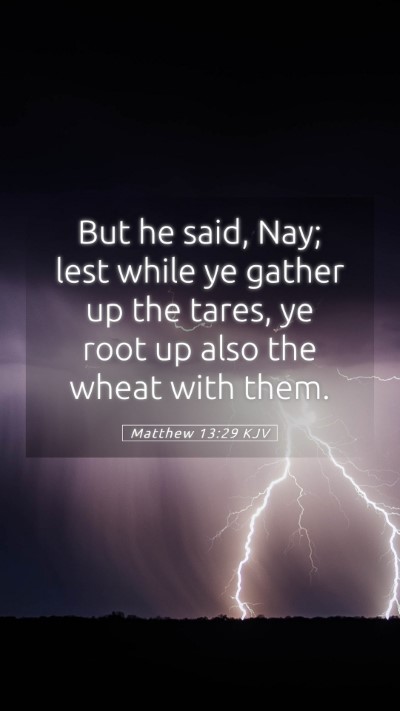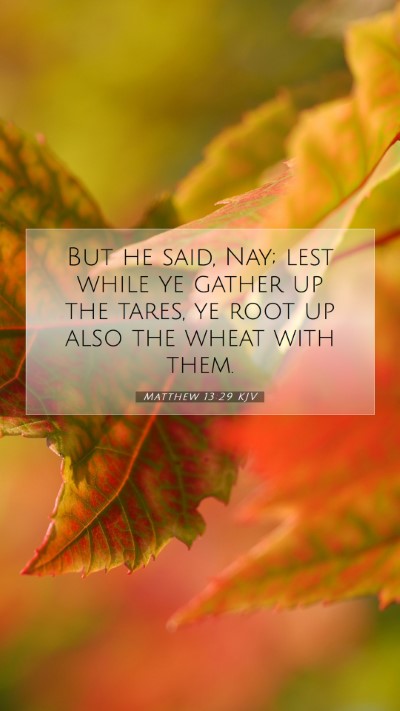Bible Verse Meaning of Matthew 13:29
Verse Context: Matthew 13:29 is part of the parable of the weeds, where Jesus explains the coexistence of good and evil in the world.
Verse Text: “But he said, ‘No; lest while you gather up the tares, you root up the wheat with them.’”
Bible Verse Interpretation
This verse reveals Jesus’ teaching on the carefulness required in dealing with both the righteous and the unrighteous within the community of believers. The imagery of wheat and tares (weeds) serves to highlight the distinction between genuine followers of Christ and those who merely appear to be believers.
Insights from Public Domain Commentaries
Matthew Henry's Commentary: Matthew Henry interprets this verse as a reminder of the necessity of patience and discernment in spiritual matters. He emphasizes the danger of hastily removing those who appear unrighteous, as they might still be redeemable. This methodical approach speaks to the larger theme of God's ultimate judgement, where He will separate the righteous from the wicked at the end of the age.
Albert Barnes' Notes: Albert Barnes elaborates on the need for caution in spiritual judgment. He points out that, while it may seem beneficial to remove the wicked immediately, doing so can inadvertently harm the faithful. This highlights the complexity of human relationships and the divine wisdom required in administering justice and mercy.
Adam Clarke's Commentary: Adam Clarke interprets this verse as indicative of the forbearance of God. He notes that God allows both the good and the evil to exist together temporarily, providing opportunities for repentance and transformation. Clarke’s perspective particularly emphasizes the importance of divine patience and the ultimate plan of salvation that God has for all humanity.
Understanding Scripture: Theological Implications
- Nature of Good and Evil: The existence of both good and evil in the world reflects a theological principle that God allows human free will.
- Divine Judgment: This verse points to the eventual day of harvest when Jesus will return to judge the living and the dead, signifying God's promise of restoration.
- Practical Application: Followers of Christ are encouraged to act with discernment, recognizing that they must coexist with those who may not share their faith.
Cross References
- Matthew 13:30 - “Let both grow together until the harvest...”
- 2 Peter 3:9 - The Lord is not slow to fulfill His promise...” - This reinforces God’s patience.
- Romans 12:19 - “Vengeance is mine, I will repay, says the Lord.” - This indicates God’s authority over judgment.
- Matthew 7:1 - “Judge not, that you be not judged.” - Emphasizing caution in judgment.
- Revelation 14:15 - The harvest of the earth has come, a direct reference to divine judgment.
Applying Matthew 13:29 to Daily Life
Understanding this verse allows believers to approach their social and spiritual environment with grace and patience. It suggests a heart posture that seeks to foster growth and restoration over immediate judgment.
Bible Study Insights
For groups or individuals looking to delve deeper into scripture, consider using this verse as a springboard for discussions about:
- The complexity of moral and ethical judgments in a diverse society.
- The role of the church in nurturing both believers and seekers.
- Practical strategies for dealing with conflict and moral dilemmas.
Further Study and Reflection
When engaging in online Bible study or group discussions, reflect on the balance between truth and love. How can we embody Christ's teachings in our daily interactions?
Conclusion
Matthew 13:29 serves as a profound teaching on the nature of good and evil, emphasizing the need for discernment, patience, and hope in God's ultimate plan. By understanding this scripture and its implications, believers can better navigate their spiritual journey and community interactions.


